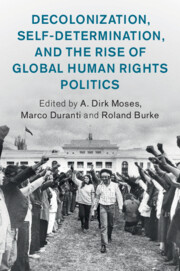Book contents
- Decolonization, Self-Determination, and the Rise of Global Human Rights Politics
- Human Rights in History
- Decolonization, Self-Determination, and the Rise of Global Human Rights Politics
- Copyright page
- Contents
- Notes on Contributors
- Acknowledgments
- Introduction
- Part I Anti-Colonial Struggles and the Right to Self-Determination
- 1 Seeking the Political Kingdom
- 2 Decolonizing the United Nations
- 3 The Limits of Humanitarianism: Decolonization, the French Red Cross, and the Algerian War
- 4 Connecting Indigenous Rights to Human Rights in the Anglo Settler States
- 5 Privileging the Cold War over Decolonization
- Part II Postcolonial Statehood and Global Human Rights Norms
- Part III Colonial and Neocolonial Responses
- Index
1 - Seeking the Political Kingdom
Universal Human Rights and the Anti-colonial Movement in Africa
from Part I - Anti-Colonial Struggles and the Right to Self-Determination
Published online by Cambridge University Press: 24 June 2020
- Decolonization, Self-Determination, and the Rise of Global Human Rights Politics
- Human Rights in History
- Decolonization, Self-Determination, and the Rise of Global Human Rights Politics
- Copyright page
- Contents
- Notes on Contributors
- Acknowledgments
- Introduction
- Part I Anti-Colonial Struggles and the Right to Self-Determination
- 1 Seeking the Political Kingdom
- 2 Decolonizing the United Nations
- 3 The Limits of Humanitarianism: Decolonization, the French Red Cross, and the Algerian War
- 4 Connecting Indigenous Rights to Human Rights in the Anglo Settler States
- 5 Privileging the Cold War over Decolonization
- Part II Postcolonial Statehood and Global Human Rights Norms
- Part III Colonial and Neocolonial Responses
- Index
Summary
This chapters surveys the place of human rights in African nationalist thought during the 1940s and 1950s. Responding to the shifts in recent human rights historiography, it seeks parity for voices that have been cast to the narrative periphery. Locating African nationalist icons, Kwame Nkrumah, Sekou Touré, and Julius Nyerere, within the debate, rather than accessories to it, the chapter finds an indissoluble connection between collective and individual liberty. Human rights were embedded in African nationalist discourse, but with a different inflection. Genealogies which select their evolutionary line derived from a particular Western variant of the discourse necessarily narrow the concept and its meaning, applying a selection test which is potentially more normative than it is historical. African invocations of human rights, which emerged in a setting of colonial hypocrisy and collective political marginalization, were less animated by individual protection from the state – their lodestar was securing a state to protect their rights.
- Type
- Chapter
- Information
- Publisher: Cambridge University PressPrint publication year: 2020
- 3
- Cited by

